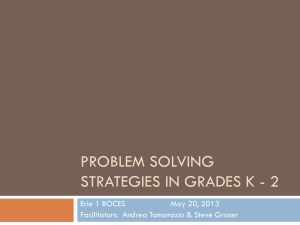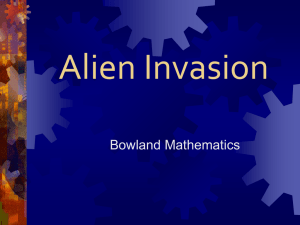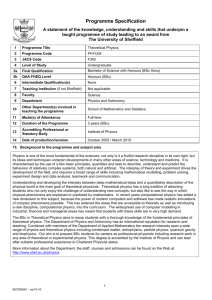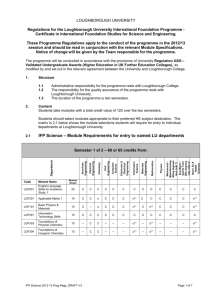Mathematics and Accounting and Financial Management
advertisement
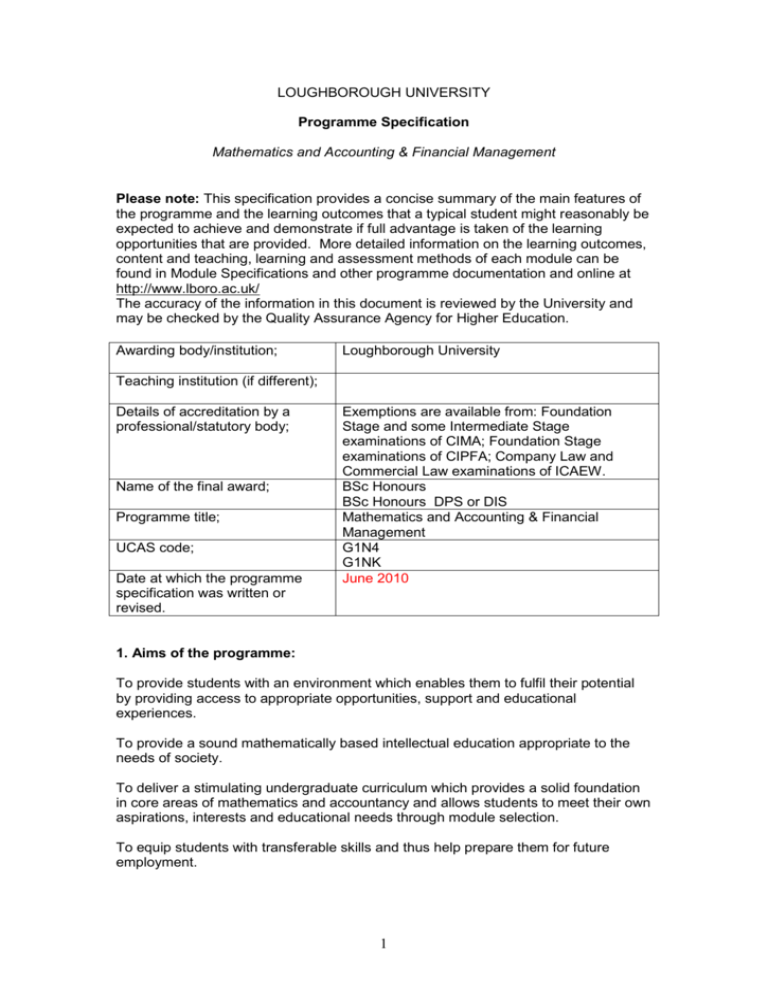
LOUGHBOROUGH UNIVERSITY Programme Specification Mathematics and Accounting & Financial Management Please note: This specification provides a concise summary of the main features of the programme and the learning outcomes that a typical student might reasonably be expected to achieve and demonstrate if full advantage is taken of the learning opportunities that are provided. More detailed information on the learning outcomes, content and teaching, learning and assessment methods of each module can be found in Module Specifications and other programme documentation and online at http://www.lboro.ac.uk/ The accuracy of the information in this document is reviewed by the University and may be checked by the Quality Assurance Agency for Higher Education. Awarding body/institution; Loughborough University Teaching institution (if different); Details of accreditation by a professional/statutory body; Name of the final award; Programme title; UCAS code; Date at which the programme specification was written or revised. Exemptions are available from: Foundation Stage and some Intermediate Stage examinations of CIMA; Foundation Stage examinations of CIPFA; Company Law and Commercial Law examinations of ICAEW. BSc Honours BSc Honours DPS or DIS Mathematics and Accounting & Financial Management G1N4 G1NK June 2010 1. Aims of the programme: To provide students with an environment which enables them to fulfil their potential by providing access to appropriate opportunities, support and educational experiences. To provide a sound mathematically based intellectual education appropriate to the needs of society. To deliver a stimulating undergraduate curriculum which provides a solid foundation in core areas of mathematics and accountancy and allows students to meet their own aspirations, interests and educational needs through module selection. To equip students with transferable skills and thus help prepare them for future employment. 1 2. Relevant subject benchmark statements and other external and internal reference points used to inform programme outcomes: The Benchmark Statement for Mathematics, Statistics and Operational Research (MSOR) Benchmark Statement for Accounting Framework for Higher Education Qualifications Loughborough University’s Learning and Teaching Strategy School Assessment Poliies and Assessment Strategies Annual and Periodic Programme Review External Examiners’ reports Staff/student committees The particular specialisms of the Schools’ staff Requirements of the professional accounting bodies (see cover page) 3. Intended Learning Outcomes 3.1 Knowledge and Understanding: On successful completion of this programme, students should be able to demonstrate knowledge and understanding of In Mathematics: 1. the core disciplines of Calculus and Linear Algebra; 2. the role of proof and deductive reasoning in mathematics; 3. the processes and pitfalls of mathematical approximation; 4. the formulation of problems in mathematical form; 5. a range of analytical, numerical, and qualitative techniques; 6. the applicability of computer software to the solution of mathematical problems; In Accounting and Financial Management: 1. business organisations in their economic, fiscal, legal and political contexts; 2. accounting and financial management in its major contexts, including the legal and social environments, the business entity and capital markets and the integral nature of the accounting function in the successful management of organisations; 3. current technical language, developments, methods, practices and issues in accounting and financial management; 4. selected alternative techniques and practices in accounting and financial management; 5. methods of recording and summarising economic events and preparation of financial statements; 2 6. analytical tools for the effective financial management of business operations; 7. contemporary theories of accounting and financial management and their related research evidence. Those students undertaking a placement should have acquired additional skills, experience and knowledge that are related or applicable to their subject area. The students should have experienced the way in which these skills are applied in practise and hence should have a better understanding of the relevance and importance of their studies. Teaching, learning and assessment strategies to enable outcomes to be achieved and demonstrated Acquisition of theoretical knowledge and understanding is, for most modules, achieved via a regular programme of lectures. Tutorials, problem classes and seminars develop this knowledge and understanding further and allow students to practise in small groups. All of these are supported by private study throughout the programme for all students. Assessment of knowledge and understanding is via a combination of unseen examination and coursework involving computer-based and in-class tests, written assignments and essays. The exact split between exams and coursework is heavily dependent on the optional modules chosen. 3.2 a. Skills and other attributes Subject-specific cognitive skills: On successful completion of this programme, students should be able to 1. demonstrate knowledge of key mathematical concepts and topics; 2. comprehend problems and abstract the essentials of problems in mathematics, accounting and finance; Those students undertaking a placement will have acquired further organisational skills relevant to their chosen area of professional training. Teaching, learning and assessment strategies to enable outcomes to be achieved and demonstrated The acquisition of subject specific cognitive skills is aided by the inclusion of teamwork projects and individual projects including reading, research, problem solving and presentation. These extended pieces of work enable students to demonstrate their application of mathematical and accounting and financial management concepts to a range of problems. Students confidence in developing sound mathematical reasoning and drawing appropriate conclusions is also supported through seminar work. While all the modes of assessment detailed to assess knowledge and understanding contribute also to the assessment of subject specific cognitive skills, these skills are particularly assessed via coursework involving in-class presentations, peer review within groups and written assignments. b. Subject-specific practical skills: 3 On successful completion of this programme, students should be able to 1. formulate and solve problems in mathematics, accounting and finance using appropriate tools; 2. construct and develop logical mathematical arguments with clear identification of assumptions and conclusions; a. record and summarise transactions and other economic events; b. prepare financial statements; c. use appropriate analytical tools for accounting and financial managements tasks; 3. gather relevant data and evidence from various sources, integrate them appropriately and reference sources adequately; 4. critically evaluate arguments and evidence. Those students undertaking a placement will have acquired further organisational skills relevant to their chosen area of professional training. Teaching, learning and assessment strategies to enable outcomes to be achieved and demonstrated Subject specific practical skills in mathematics and accounting and financial management involves the application of cognitive skills to the practices of solving problems in mathematics and in business. The acquisition of subject specific practical skills is aided by the inclusion of teamwork projects and individual projects including reading, research, problem solving and presentation. These extended pieces of work enable students to demonstrate their application of mathematical concepts to a range of problems. Students confidence in developing sound mathematical and accounting and financial management reasoning and drawing appropriate conclusions is also supported through seminar work. Assessment of subject specific practical skills is via coursework involving computer-based and in-class tests, in-class presentations, peer review within groups, written assignments and essays. c. Key/transferable Skills On successful completion of this programme, students should 1. possess general study skills, including the ability to learn independently using a variety of media; 2. have good time-management and organisational skills; 3. have highly developed skill of numeracy; 4. have general IT skills; 5. communicate quantitative and qualitative information, analysis, argument and conclusions in appropriate ways; 6. gather relevant data and evidence from various sources, integrate them appropriately and reference sources adequately; 7. critically evaluate arguments and evidence. Teaching, learning and assessment strategies to enable outcomes to be achieved and demonstrated 4 The acquisition of transferable skills is aided by the inclusion of teamwork projects and individual projects including reading, research, problem solving and presentation. These extended pieces of work enable students to develop general skills that can be applied in other areas of their work. Through collaborative engagement in workshops and seminars, and in group work and presentations, students get opportunity to expand their horizons, compare their own skills with those of their peers, and develop more confident approaches to communication, organisation and working collaboratively. Assessment of transferable skills is largely through coursework involving computer-based and in-class tests, in-class presentations, peer review within groups, written assignments and essays. 4. Programme structures and requirements, levels, modules, credits and awards: The programme is a three/four-year, full-time course of study, with the option of spending the third year on a professional placement, or at a European or overseas University. The programme is divided in to units of study called modules, which may be rated as 10 (single) or 20 credits (double). Each Part of the programme comprises 120 credits taken over one year of study, usually 60 credits in Semester 1 and 60 credits in Semester 2. Each semester lasts 15 weeks, with 11 weeks of teaching followed by revision time and examinations. In Part A (Year 1), students take 120 credits of modules, of which 60 are core mathematics modules and 60 are core business studies modules. Part B (Year 2) further develops students’ knowledge, understanding and skills in mathematics, accounting and finance and provides the opportunity to choose two optional 10 credit modules in either mathematics or business studies. Students have the option to spend their third year on a professional placement or at a European or overseas University. On successful completion of the placement and the programme, students will be awarded the Diploma in Professional Studies or the Diploma International Studies, respectively, in addition to their degree. Part C (Year 4) comprises of core modules in accounting subjects together with a range of optional modules, which can be chosen from both mathematics and business studies subject areas. Students must study at least 50 credits of each subject area. Full details can be found in the Programme Regulations at: http://www.lboro.ac.uk/admin/ar/lps/progreg/year/1011/index.htm 5. Criteria for admission to the programme: These can be found at:http://www.lboro.ac.uk/prospectus/ug/courses/dept/ma/mwafm/index.htm 6. Information about assessment: 5 Students study modules weighted at 120 credits each year. The following modules count for 20 credits: Calculus; Linear Algebra; Financial Accounting Fundamentals; Management Accounting A; Advanced Financial Accounting; Management Accounting & Control. All other modules have a weighting of 10 credits. In order to progress from Part A to Part B, students must accumulate at least 100 credits in Part A modules, including Calculus and Linear Algebra, and in at least one of the core Business modules, BSA017 and BSA018. Candidates must also obtain a minimum of 30% in the remaining modules. To progress from Part B to Part C, students must accumulate at least 100 credits including at least 40 credits in modules in each of Mathematics and Management and in addition must achieve at least 30% in BSB005 (Management Accounting) and BSB007 (Intermediate Financial Accounting). To be eligible for a degree at the end of Part C, students must accumulate at least 100 credits, including at least 30 credits in modules in each of Mathematics and Management, and obtain at least 20% in the remaining modules. Any student who fails to meet these requirements has the right to re-sit (once and once only) any module which is causing them to fail the year. A Diploma of Professional Studies or a Diploma of International Studies is awarded to graduating students who successfully complete their placement or a year of study at a European or overseas university, respectively. Full details can be found in the official Programme Regulations (see the link in section 4). 7. What makes this programme distinctive This joint honours programme provides a solid foundation in the essential core areas of both Mathematics and Accounting & Financial Management. It includes a range of optional topics in the final year that enable students to follow their own interests and inclinations in these fields, and training in the kinds of skills that are required for employment in a variety of roles in our modern society. The separate parts of the programme are taught by staffs of the School of Mathematics and the Business School who each have expertise and research experience in their respective disciplines. This expertise is reflected both in their teaching and in the range of topics that are available as final year options in particular. A sandwich version of this programme exists so that students who wish to undertake a year of professional training, or study at a European or overseas university, after the second year may do so. After the appropriate supervision and assessment, this leads to the award of a Diploma in Professional Studies or a Diploma of International Studies, respectively. 8. Particular support for learning: Full details are available online at http://www.lboro.ac.uk/admin/ar/templateshop/notes/lps 9. Methods for evaluating and improving the quality and standards of learning: Further details are available online at 6 http://www.lboro.ac.uk/admin/ar/templateshop/notes/lps/ 7






